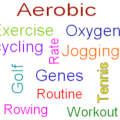We all know that for all the individuals wanting to exercise, there are many ways to do so. Some individuals prefer stretching and toning to high impact aerobics. Others may have a preference for Zumba over walking.
While there are many different variations and just as many preferences, it is important to know as much as you can before taking on any type of exercise regime.
High intensity training (also known as HIT) works the same way. The more you know, the more you can judge for yourself whether or not HIT is the exercise regimen for you.
What Is High Intensity Training?
 Originally, high intensity training utilized intense weight lifting and repetition. The goal back then in the 1970s was to produce a greater muscle mass in a shorter period of time. Limited yet frequent and highly intense weightlifting is the foundation behind this type of high intensity training.
Originally, high intensity training utilized intense weight lifting and repetition. The goal back then in the 1970s was to produce a greater muscle mass in a shorter period of time. Limited yet frequent and highly intense weightlifting is the foundation behind this type of high intensity training.
Today’s version of high intensity weight training works similarly. Repeated bouts of intense, but short courses of movement followed by a less intense form of movement is part of what makes up today’s high intensity training.
Success in High Intensity Training
Research is beginning to show that there is success when using high intensity training. For example, a study done at the American College of Sports Medicine shows that two weeks of high intensity intervals improves your aerobic capacity as much as 6 to 8 weeks of endurance training.
If such is the case, that is a benefit pointing to the success of high intensity training. Another benefit points to the ability to burn fat long after a high intensity training workout.
Some studies are showing that individuals who utilize high intensity training are able to exercise for longer periods of time at a higher rate than before.
The Downside of High Intensity Training
As with any exercise regimen, if you do not know what you are doing or do not have the help of professional, there is always the chance for risk of injury or harm.
Taking on high intensity training without the advice of a doctor and at the very least a healthy heart check-up is risky and dangerous.
Performing high intensity training on an empty stomach could result in many dangers such as:
- Fainting
- Dizziness
- Injury
- Nausea
- Vomiting
- Physical injury
- Muscle weakness
So before starting this type of exercise, make sure you see your doctor to ensure your heart is able to cope with this strenuous activity.





